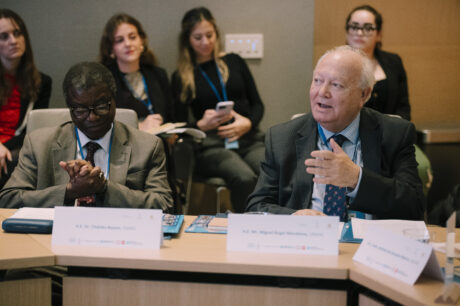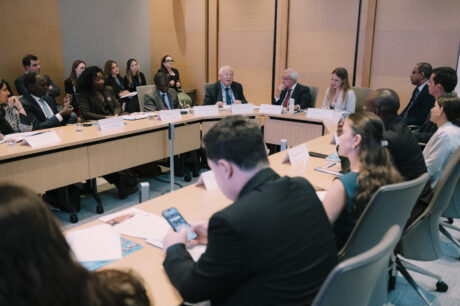Remarks by Under-Secretary-General Miguel Ángel Moratinos,
High Representative for UNAOC,
UN Special Envoy to Combat Islamophobia,
at the UNGA80 Side Event on
“Keeping Faith in Dialogue: Reimagining Interreligious Cooperation for a New Agenda for Peace”
25 September 2025, Bahá’i International Community’s United Nations Office
Excellencies,
Distinguished participants,
I am very pleased to be here.
I see many partners here that we have worked with closely over the years, institutionally as a UN entity and as co-chairs of the Interagency Task Force since 2019.
I wish to commend the organizers, KAICIID, and the co-sponsors the Permanent Missions of the Kingdom of Saudi Arabia, Austria, the Portuguese Republic to the UN in New York and Religions for Peace as well as all the partners involved in this event on the margins of the busy high level week.
We gather at a time when world leaders have come together for the United Nations General Assembly to celebrate the 80th anniversary of the Organization and recommit to the foundational principles of the United Nations.
For the past eight decades, the United Nations has stood as a beacon of hope, born from the devastation of the World War and animated by the determination of “We the Peoples” to chart a more peaceful and just future.
Today, however, that vision faces unprecedented tests. We are living in an era marked by paradox. On one hand, our world is more interconnected than at any point in human history. Yet, at the same time, it is increasingly polarized and fragmented.
We face transnational challenges that do not respect borders: climate change, pandemics, terrorism, cyber threats, forced displacement, widening inequalities, and food and energy insecurity.
At the same time, geopolitical rivalries are deepening, nationalism is on the rise, and trust in multilateral institutions is eroding.
Multilateralism is not only being questioned—it is being challenged in practice.
Distinguished guests,
Allow me to focus my intervention here on the power of spiritual diplomacy as we are living through an age in which the misuse of religion as a tool for division is far too frequent.
In such times, our collective duty is to reclaim the peacemaking power of religions, and to remind humanity of the spiritual and moral foundations that bind us together as human beings.
Religions, at their core teachings , are a valuable source of compassion, forgiveness, and reconciliation. Time and again, we have seen religious leaders stand at the forefront of efforts to ease tensions when political negotiations reach an impasse.
Their voices carry a moral authority that can open doors where official diplomacy may struggle.
I can personally attest to that. As a veteran diplomat and politician and more so in my current capacity, I often resorted to the mediating skills of wise religious leaders and faith actors to achieve a breakthrough.
This is what I would call spiritual diplomacy — diplomacy of conscience, grounded in ethical values — one that transcends politics.
Spiritual diplomacy complements the work of states and international organizations by appealing to the deepest aspirations of the human heart: the longing for peace, dignity, and justice.
At a moment when our humanity is at risk, we must harness this peacemaking potential to remind societies that reconciliation is always possible.
Dialogue in all its forms, however, is not a one-time event or a random act of doing good.
It is not simply convening in grand halls to exchange ideas. True dialogue is a practice — a daily discipline of listening, respecting, and learning from one another. It is lived in neighborhoods, classrooms, and workplaces as much as it is articulated in conferences.
Dialogue is a way of life.
At the United Nations Alliance of Civilizations, we have recognized 2 decades ago that dialogue is imperative . Dialogue across cultures and religions continues to be at the heart of our mandate.
We know that dialogue, when sincere and sustained, becomes the foundation for living together in peace or convivencia.
As we turned 20 this year, our network of religious leaders and faith actors have evolved and expanded. Our role has evolved within the UN system and beyond. We are proud to be the leading UN entity in intercultural and interreligious dialogue.
We are deeply convinced that dialogue empowers communities to resist the forces of hatred and polarization. It equips societies to embrace diversity not as a threat but as a source of enrichment and unity.
And it ensures that the next generation — particularly young people and women — are empowered to be agents of peace, dialogue, and mutual respect.
The United Nations Alliance of Civilizations continues to re-iterate the call for dialogue, to achieve peace and end wars. A dialogue that rebuilds trust and paves the way to living together in peace.
I thank you




